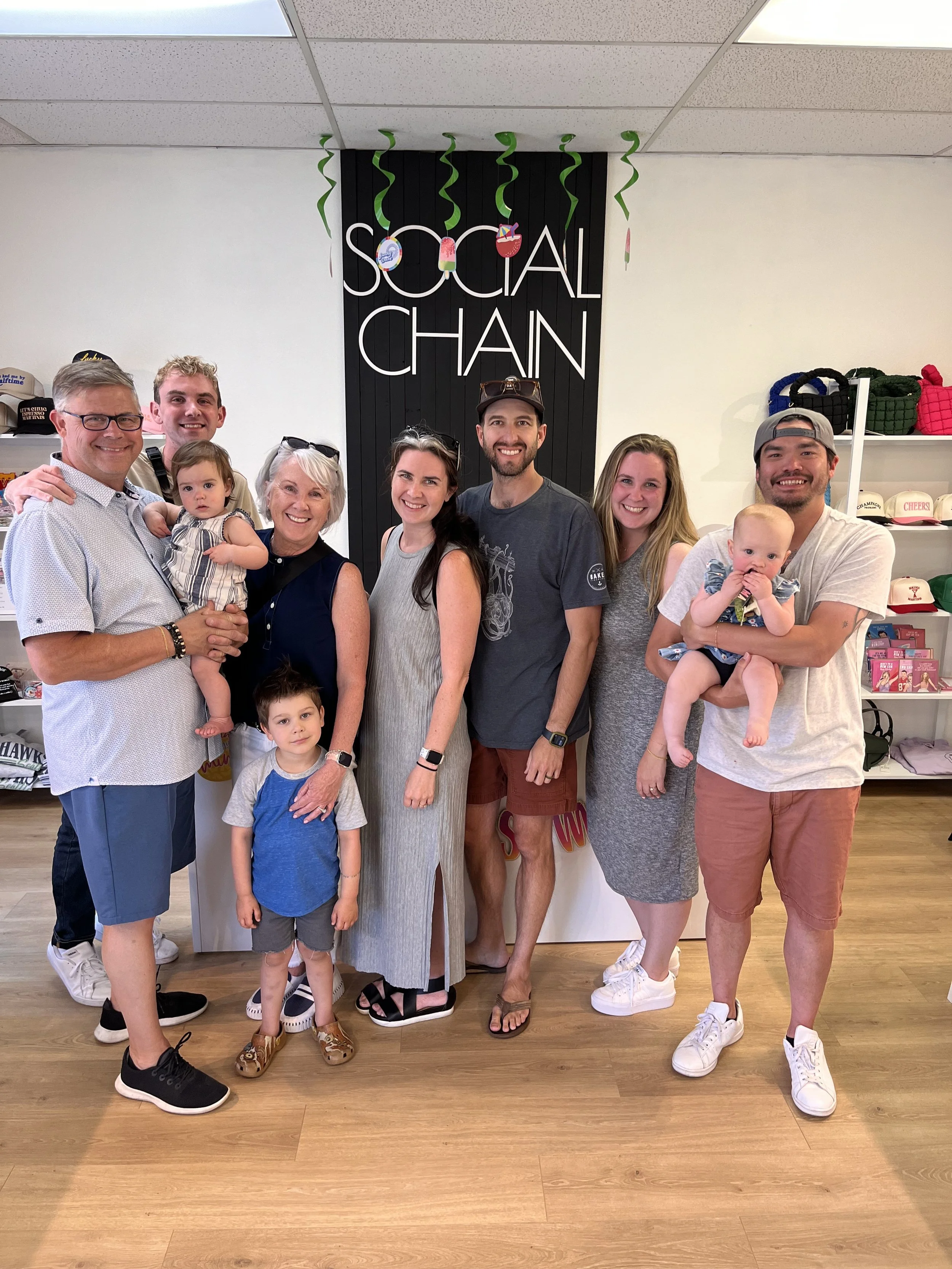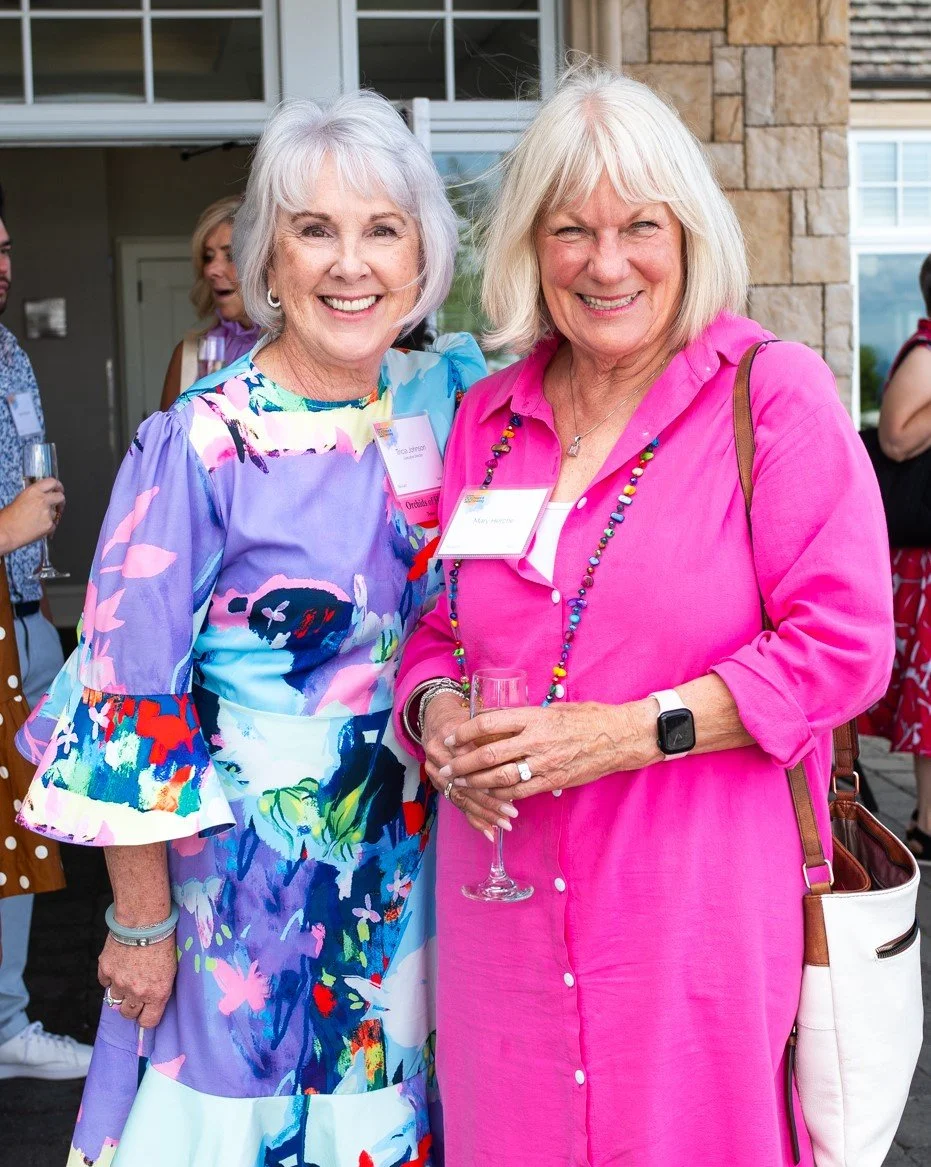Tricia Johnson - Northwest Hope & Healing
Thirlby Co. Leader to Learn From: May 2025
May 7, 2025
In 2012, while juggling her role as a full-time development director and mother of three, Tricia Johnson received life-altering news: she had been diagnosed with triple negative breast cancer.
“[It was] out of the blue,” Tricia shared. “I had no history at the time that I was aware of. I approached it like a job and went through multiple surgeries,12 rounds of chemo, and 35 radiation treatments.”
Years later, Tricia’s cancer journey led her to become the executive director of Northwest Hope and Healing, a Seattle-based nonprofit providing immediate, no-barrier financial assistance to local breast and gynecologic cancer patients facing financial hardship.
“Looking back, I realize I wouldn’t have been ready for this opportunity had it come any sooner,” Tricia explained. “I needed time to grow in my own survivorship journey first.”
Read on to learn about Tricia’s career pivot from the hospitality to philanthropy, her lessons as a working mom, and her advice for supporting a loved one with cancer.
OUR INTERVIEW WITH TRICIA
Your career began in the hospitality industry and then transitioned to the philanthropy space. Tell us about that.
Service became a part of my DNA from my early 20s. I graduated from Washington State University with a degree in hospitality management and started in the industry at the Four Seasons Hotels and Resorts when I was 22. The Four Seasons was highly mission-driven. We empowered our staff to provide the best service, the best care, and anticipate needs. Our goal was to become the top-performing hotel in every city we chose to operate in.
After 13 years at the Four Seasons, I got a call from a principal, asking me to consider a development director role at her school. I loved the hotel industry but the only reason why I left was because we had three kids and I was in an industry that was open 365 days a year. I truly loved the hotel industry, but as a mother of three, it became increasingly difficult to balance the demands of a management role that required me to be on call 365 days a year. My decision to step away wasn’t because I lost passion for the work—it was because my family needed me more
This month you will celebrate Mother’s Day. What has your experience as a working mom taught you?
In the early days, I was too young to think about it. It was hard in the hotel industry. I was one of only two women on the executive team. I asked to cut back my hours after having two kids. Both of my kids had significant health challenges, and it took them six months for my work to make a decision. This was back in 1991.
As women we do what we need to do to survive. I was one of only a handful of mothers who worked when my oldest daughter started Kindergarten. Balancing work with finding time to be present at school was constantly challenging. Unknowingly, when I moved into the nonprofit sector and was doing mission-centric work with families, it ended up working for me. I was pulled into it.
If you could wave a magic wand, what would life look like for working moms?
Women would be confident that they can ask for things, and be confident that they can commit to both parts of their lives with everything they have. We need to provide the time that needs to be taken. I went back to work as early as 6 weeks with one of my kids.
We also need to be more flexible with moms at work. The reality is, most things fall on the mom still, even if you have a partner who is really engaged. And if we care for moms, we are creating a brighter future because their kids will thrive. We also need to normalize men saying at work, 'I need to head home to take care of the kids.”
On top of being a working mom, you are a breast cancer survivor. Tell us a bit about your journey.
I was first diagnosed in 2012, out of the blue. I had no history at the time that I was aware of. What was so surprising was how aggressive it was - triple negative breast cancer. I approached it like a job. At the time, I was working at Holy Names Academy and was well-supported by my employer and colleagues. I went through multiple surgeries, 12 rounds of chemo, and 35 radiation treatments. Since discovering a genetic mutation in 2018, I now undergo an annual procedure as part of my ongoing care.
Sometimes people want to put cancer in a box. They want to pretend that you can put it away and put it on a shelf. It is forever with you. Some people are tired of hearing about it. Now two of my three kids have the gene. We all have an additional risk of pancreatic cancer. There is hope associated with having this knowledge, but every time you get a scan you hold your breath.
Today, you serve as the executive director of Northwest Hope and Healing. How did your own battle with breast cancer lead to the work you’re doing today?
We were supposed to move to Texas for my husband’s work. I was diagnosed in February of 2012. When we realized how hard and long the treatment was going to be, we knew we couldn’t leave. I ended up staying at Holy Names for another 10 years. Having breast cancer and being an advocate for women (at an all girls’ high school) was essential.
At Northwest Hope and Healing, I’ve come to see that stories are powerful empathy machines. Looking back, I realize I wouldn’t have been ready for this opportunity had it come any sooner—I needed time to grow in my own survivorship journey first. It was actually my oncologist who first told me about the role.
What advice would you have for someone supporting a loved one through a difficult time?
Show up. Don’t overthink it. Be there to listen. Be present.
A fellow survivor once told me not to say, 'Let me know if you need anything,' because it puts the burden on someone already overwhelmed. I've tried to keep that in mind when supporting others on their cancer journey.
I’ll never forget what a friend did for me after I was diagnosed. We weren’t able to plan anything for our son for spring break, and she - despite having four kids of her own - called me and said: ‘We’re taking Sam with us.’ It was the greatest gift, and she’s continued to show up for me ever since.
How would you define confidence?
The willingness to put yourself out there and take risks and be true to your values. Knowing your truth.
What is your mission or purpose in life?
To help people. To bring light in darkness, and bring hope. Northwest Hope and Healing may not be able to do it all - but if we can help one person make it through another day, that’s everything. Sometimes, it’s just about getting through today.
What is your greatest superpower as a leader?
Turning my passion and pain into purpose. I needed the face of someone who survived what I survived, and be surrounded by positive people. Google has not been good to me. I once had a male doctor say I had a 40 percent chance of survival and he wouldn’t want to trade places with me. I never saw him again.
What do you think is the most important skill a leader must have to successfully manage people?
Being able to listen. Engage. Encourage openness. I intentionally hire and surround myself with people who are more talented than me. What I bring to the table is lived experience.
What is something that might surprise people about you?
I hate being behind a camera.
What advice would you have for someone who is struggling or feeling stuck right now in their life or career?
Be patient. Do a joy audit. Think about the moments that make you feel the most successful and valued. Be sure you’re authentically carrying the flag.
What is one piece of advice you would give to your younger self?
You are way stronger than you think.
Anything else you’d like to share with our readers?
It’s never too late to learn. My generation gets to a point where we think we know it all. We think we have the answers - we don’t. With every passing day I have to be more open.
It all boils down to fear. Fear of the truth. Fear of realizing that there are other ways of looking at things. Fear of the unknown. Opening up brings fear because you think: ‘Oh my gosh, I might have been wrong.’
Embracing other’s stories has set me free and helped me become the person I was meant to be.
About Tricia Johnson
Tricia Johnson is the Executive Director of Northwest Hope & Healing (NWHH), a Seattle-based nonprofit providing immediate, no-barrier financial assistance to local breast and gynecologic cancer patients facing financial hardship. Since joining NWHH in 2022, Tricia has led the organization through a period of transformative growth—expanding its visibility, deepening community partnerships, and increasing its capacity to serve patients across the Puget Sound region.
A proud Seattle native and breast cancer survivor, Tricia brings both a personal understanding of the challenges faced by NWHH’s patients and over 25 years of leadership and fundraising experience in the nonprofit sector. Her work is grounded in a deep belief in the power of compassion, connection, and community to change lives.
At NWHH, Tricia oversees all aspects of the organization’s strategy, fundraising, operations, and community outreach, working closely with the Board of Directors. Under her leadership, the organization has surpassed key milestones - including distributing over $2.75 million in patient assistance grants and delivering more than 10,000 Healing Boxes filled with comfort items to women undergoing treatment. She has played a central role in expanding NWHH’s fundraising events, donor engagement, and partnerships with local organizations, while also addressing the organization’s growing operational and capital needs. Tricia is passionate about helping supporters connect their generosity to meaningful, tangible impact for patients in need.
Tricia’s professional path began in the hospitality industry after earning a B.S. in Hospitality Business Management from Washington State University. She held leadership roles at Westin Hotels and the Four Seasons Olympic (now Fairmont Olympic) Hotel in Seattle before transitioning to the nonprofit sector in 2001. She later served as Development Director at St. Monica Catholic School and Holy Names Academy, leading highly successful advancement programs and raising over $30 million in support of scholarships, educational programs, and capital projects.
Outside of her work, Tricia enjoys biking, relaxing at McKee’s Beach on the Puget Sound, and spending time with her husband, children, and grandchildren - her most treasured role yet. You can make a donation in Tricia’s honor by visiting Northwest Hope & Healing.
About This Feature
Leaders to Learn From is a standing feature in The Thirlby Company’s monthly newsletter that recognizes outstanding leaders in our community who demonstrate our company’s core values. You can learn about our other honorees here, or subscribe to our newsletter to receive this feature and more inspiring content in the future.





